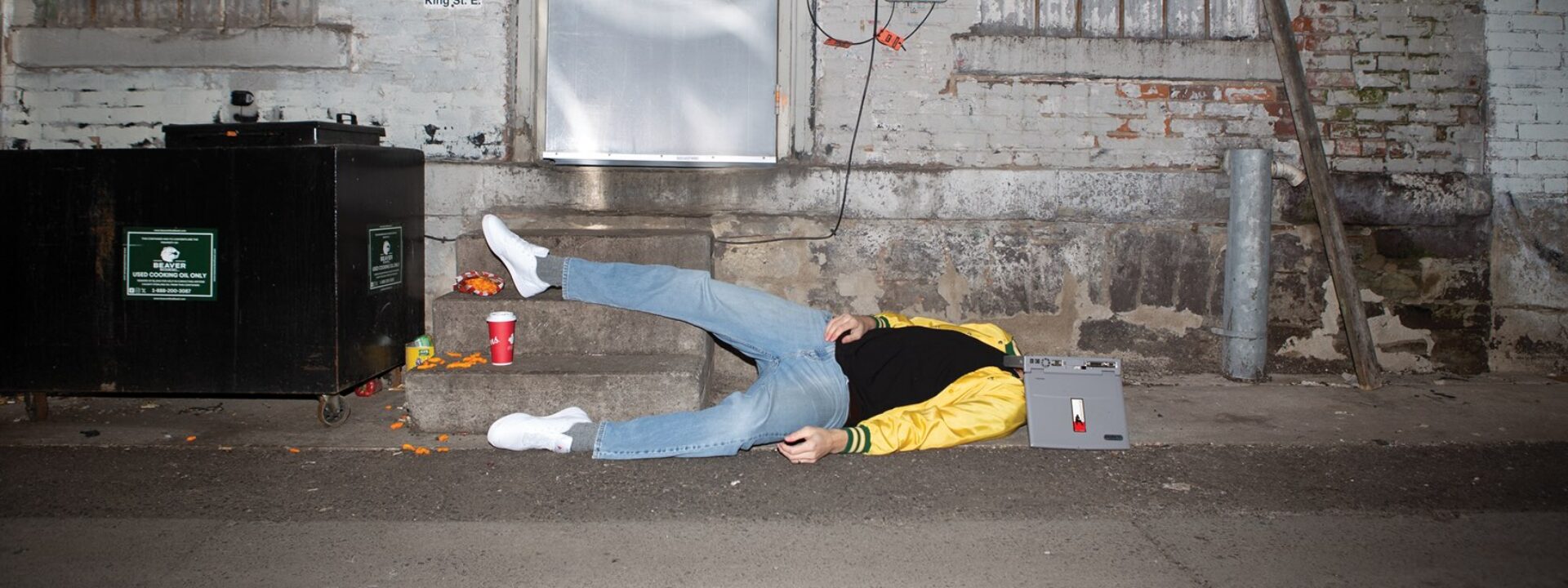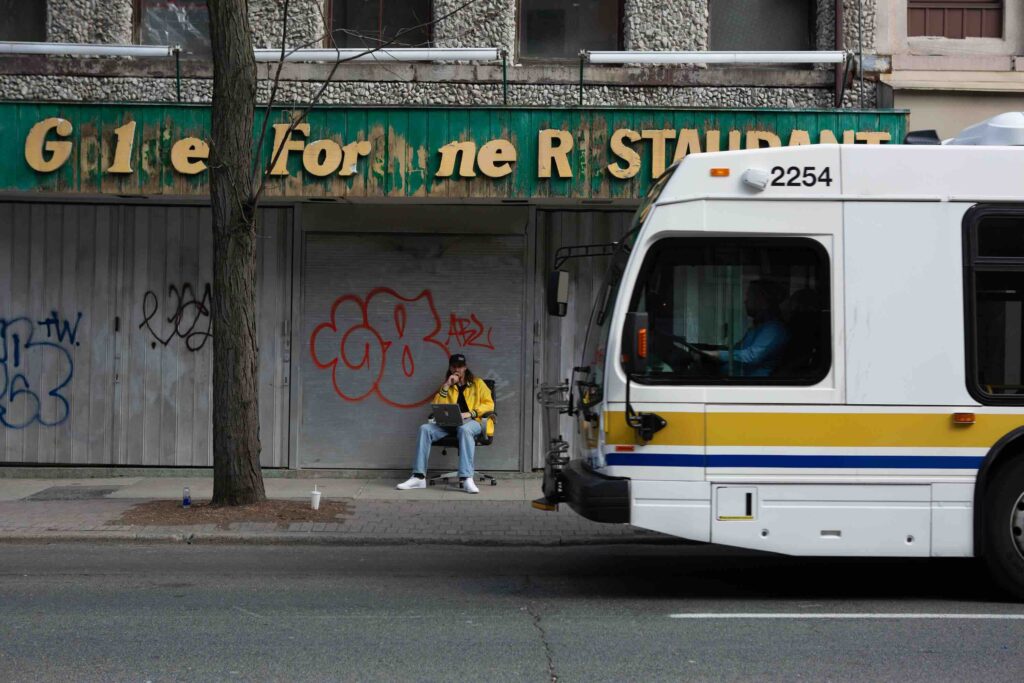Peter Lazar: The accidental tech entrepreneur

The silent partner in Maipai jumped in when the Barton Street pizza joint had to pivot to takeout in the pandemic. The result, a platform called Pavement, is now providing a buy Canadian solution to ordering in.
Buy Canadian has never felt more urgent.
Many of us are meticulously reading food labels at the grocery store and checking where our produce is coming from. But are we being as careful about where we order takeout?
That’s the question that drove Peter Lazar, a silent partner in Hamilton’s beloved Maipai Pizza, to accidentally launch Pavement, a homegrown ecommerce platform taking on American-owned delivery giants.
“The idea behind Pavement is, really, we want to see Canadians ordering directly from Canadians and sending less of their money down south,” says Lazar. “Third-party apps have really decimated local restaurants and have taken away from communities. They’re convenient, they've got whatever you want: you can get toilet paper and a hamburger at the same time. But they don’t do anything at the community level.”
A proud Hamiltonian for more than 20 years, Lazar is not your average tech entrepreneur. His laid-back energy and fun, irreverent sense of humour help him stand out in a sea of overly-serious tech bros.
The reluctant founder was born and raised on Australia’s Gold Coast and comes from a tight-knit, community-minded family. As a child, he volunteered with Meals on Wheels and travelled to orphanages in Thailand. In his late teens, he moved to Mozambique on a humanitarian aid mission where he helped deliver healthcare, education and food programs to the local community.
In 2005, Lazar moved to Canada for a six-month humanitarian training course. During the program, he met his future wife and has lived in Hamilton ever since.

With philanthropy always top of mind, Lazar launched an event marketing company called Tusq.
“I wanted to start a social enterprise, a for-profit company that, in its charter, would donate a portion of its revenue, not just its profits. That's kind of why I started out in business in the first place.”
Thanks to Lazar’s hard work, Tusq grew beyond weddings and birthday parties to establish a stronghold in corporate events, delivering branded experiences for major clients like Shopify, Entertainment One, and Wealthsimple.
During this time, Lazar’s friend and neighbour Salar Madadi (founder of Pokeh, one of Canada’s first poke-focused restaurants) asked if he wanted to help open Maipai, a tiki bar serving pizza in the heart of Barton Street.
“And I was like, ‘Well, that’s stupid for starters. A ridiculous concept. So absolutely, let’s do it.’”
Located at 631 Barton St. E., Maipai launched in 2019 and offers an immersive dining experience, blending retro tiki vibes with street-style edge. Patrons can sip on tropical cocktails and savour Detroit-style pizza while awash in neon lights.
It’s a real vibe.
This was the first permanent installation under the Tusq brand and a passion project for Lazar. The pizza joint would go on to win several awards, including best pizza recipe for the restaurant's Mala Honey Pie at the Canadian Pizza Summit in 2021.
But less than six months after opening, COVID hit, and the team behind Maipai had to, as we loved to say at the time, pivot.

“When we opened Maipai, we hadn’t thought of doing takeout. All of a sudden, we were faced with this kind of dilemma: we haven't built a customer base because we just opened up the door, so people don't really know who we are. We've spent the better part of a year designing and building out the restaurant. This isn’t just pizza in a box. It’s an experience.”
Despite the pandemic buzzkill, Maipai kept those good vibes alive during lockdowns, setting up a mock tiki bar outside the restaurant, creating a pizza box scavenger hunt and concocting an elaborate backstory involving Nicholas Cage hijacking the restaurant to explain why it was closed.
“We didn’t mention COVID once in our marketing,” says Lazar.
And yet, management still had the problem of taking online orders.
“We couldn't afford to use third-party delivery apps and part with 30 per cent of our profits,” says Lazar. “Until I started (running my own) restaurant, I didn't have a clue how bad the profit margins really are. You go on a Friday night, and you’re like, oh, this place is hopping. They must be killing it. And it's like, you're not there for 80 per cent of the rest of the time when the place is empty.”
They tried some out-of-the-box options, but nothing seemed to fit the bill for a small local restaurant. They tried one popular plug-in on their website, and it was a complete disaster. Deliveries were sent to the wrong places, and the printer stopped working halfway through an evening rush. The team ended up writing all their orders by hand.
It was clear Maipai needed to create its own ordering solution. With rudimentary development skills, Lazar found some existing source code and hacked it together to create a basic online ordering system for the business. And while it wasn’t perfect, it worked. Maipai launched it on its website and started taking orders.
What was meant to be a two-week stop-gap solution until indoor dining restrictions were lifted turned into a month, which turned into six weeks. Restaurant owner friends in similar predicaments started reaching out to ask if Lazar could build them a similar system. In true community spirit, Lazar agreed.
Six weeks turned into six months, and when winter hit, Tusq’s corporate events had all but dried up.
After 10 years, Lazar’s events business was done.
But Lazar was not deterred. This new online ordering system, Pavement, was doing well, and more and more restaurants from across Canada were showing interest in the platform.
“Pavement was one of those things that happened completely by mistake,” says Lazar. “It was definitely fortunate timing. This journey was very different from starting a business and growing it over 10 years.”
Lazar realized that he needed to make the solution a “forever product” rather than a hacked-together platform.
He decided to rebuild Pavement from the ground up, and brought on some developers to recreate the platform from the very first line of code. The experience was “a journey” and a big lesson for Lazar.
“I've always been involved in sectors where people are motivated by something more than just money,” says Lazar. “Restaurant owners aren't running restaurants because they want to become millionaires. They're doing it because they love food. Tech is not that industry. It is driven by cold, hard cash, and that, to me, isn’t enough of a motivator.”
Though Lazar’s background in the hospitality and events industry served him well in creating a platform that was tailored to the needs of small, local restaurants, he realized he was out of his element when it came to navigating the tech space. The job title on his LinkedIn profile even says, “Guy who runs tech company (by mistake).”
“I was green in the world of tech, understanding how developers work and what the industry was like. And how cutthroat it was. That easily was the biggest challenge.”
Despite the technological hurdles, turning Pavement into a “forever product” drew Lazar back to what had motivated him to get into business in the first place.

“The thing that attracted me to creating Pavement was going back to where I had originally started out, (trying to) help fund grassroots organizations. The potential and the scalability of Pavement and the tech made that very realistic. Like, oh, this could actually make a meaningful impact. I'd struggled to find that footing with Tusq.”
During the pandemic, Pavement worked with Innovation Factory as part of its partner program to help local restaurants, like Hamilton favourites Mystic Ramen and Golden Tenders, get set up on the platform. Today, Pavement counts some of Hamilton’s favourite eateries – The Mule, Donut Monster, Electric Diner, Cowabunga and Parm Bros – among its customers.
The incubator also connected Lazar with tech experts who could help provide industry-specific guidance and support, such as how to make Pavement attractive to investors.
But Lazar’s not looking for outside investment anytime soon.
“We’re bootstrapped, 100 per cent independent and Canadian-owned. We don’t have any American dollars in our pockets. We’d like to stay that way for as long as we can. We're growing at a rate that's slow and steady. I'm comfortable with it and happy with that kind of trajectory for the time being.”
While Pavement helps restaurant owners save money through online ordering, Lazar’s next venture will help them get discovered by locals in their community.
Tasty Local is a consumer-facing platform that connects residents with local restaurants so they can order from them directly and read reviews from influencers and local publications.
“What we're trying to do with Tasty Local is bring some life back into our local communities,” says Lazar. “With Pavement, we created a solution for restaurants to be able to take orders directly from their websites and social media platforms. The next missing piece was always, OK, that's great, but if no one knows about your restaurant, what's the point? With Tasty Local, we created a platform that would allow Canadians to find out how to order directly from restaurants and how much money they save when they do that.”
Lazar estimates that when someone uses Tasty Local, they’ll save between 20 per cent and 30 per cent on average per order compared to third-party delivery apps. That’s good news for the consumer and restaurants. Tasty Local will also feature vendors that aren't listed on any third-party apps like Maipai and Cowabunga, as well as vetted reviews.
Tasty Local will launch a public beta starting in May and is planning a “grad party”-themed launch event in late June. The goal is to establish a Hamilton presence and eventually expand to Ottawa and the east coast.
Hamilton feels like the natural place for Lazar to launch Tasty Local, not just because he’s lived here for 20 years but because the community spirit is so deeply rooted within the restaurant scene.

“The positive of a town like Hamilton is that community feeling. It's like a small, big city, particularly with restaurants,” says Lazar. “The level of support that the business owners have for each other is almost unheard of. Say something floods. You can call up the pizza shop down the road and say, ‘Hey, can you help?’ And they're gonna come over and help you out, even if you're in competition. From a business standpoint, you don't see that level of community very often. It’s a big attraction.”
But that small-town feel of Hamilton can often come with a sense of exclusivity, which Lazar says can make it harder for restauranteurs to grow.
“Hamiltonians seem to be a little bit Hamilton or nothing. There's a wariness of things that are from outside of Hamilton,” says Lazar. “I think that that limits the ability of a lot of Hamiltonian businesses to think outside of the city. It's OK to expand outside of Hamilton. You can still stay true to Hamilton, but also bring what you've got to the rest of the world.”













